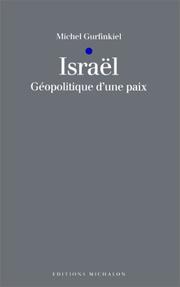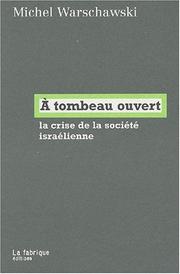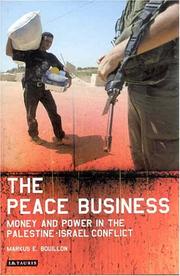| Listing 1 - 8 of 8 |
Sort by
|
Book
ISBN: 287899129X 9782878991291 Year: 1996 Publisher: Paris Le Monde-Editions
Abstract | Keywords | Export | Availability | Bookmark
 Loading...
Loading...Choose an application
- Reference Manager
- EndNote
- RefWorks (Direct export to RefWorks)
Assassination --- Judaism and state --- Orthodox Judaism --- Judaisme et Etat --- Religious aspects --- Judaism. --- Rabin, Yitzhak, --- `Amir, Yig'al. --- Assassination. --- Israel --- Israël --- Politics and government. --- Politique et gouvernement --- ʿAmir, Yigʾal. --- Politics and government --- Israël --- Rabin, Yitzhak --- Assassination - Religious aspects - Judaism. --- Judaism and state - Israel. --- Orthodox Judaism - Israel. --- Rabin, Yitzhak, - 1922- - Assassination. --- Israel - Politics and government - 1993 --- -Assassination --- Rabin, Yitzhak, - 1922 --- -ʿAmir, Yigʾal.

ISBN: 2841860388 9782841860388 Year: 1996 Publisher: Paris : Editions Michalon,
Abstract | Keywords | Export | Availability | Bookmark
 Loading...
Loading...Choose an application
- Reference Manager
- EndNote
- RefWorks (Direct export to RefWorks)
Jewish-Arab relations --- Palestinian Arabs --- Peace --- Relations judéo-arabes --- Palestiniens --- Paix --- Politics and government --- Politique et gouvernement --- Israel --- Israël --- Arab-Israeli conflict --- Relations judéo-arabes --- Israël --- Palestinian Arabs - Israel - Politics and government --- Arab-Israeli conflict - 1993- - Peace --- Israel - Politics and government - 1993 --- -Jewish-Arab relations
Book
ISBN: 9782348043444 2348043440 Year: 2023 Publisher: Paris La Découverte
Abstract | Keywords | Export | Availability | Bookmark
 Loading...
Loading...Choose an application
- Reference Manager
- EndNote
- RefWorks (Direct export to RefWorks)
"Imagine-t-on en France une loi qui établirait deux catégories de citoyens : par exemple, les "Français de souche" et les autres, qui ne bénéficieraient pas de droits égaux ? Une loi ségrégationniste de ce type, le Parlement israélien l'a votée en 2018, au bénéfice des seuls citoyens juifs. Comment s'étonner que, de Trump à l'Indien Modi, du Hongrois OrMn au Brésilien Bolsonaro, les nouveaux dirigeants dits "illibéraux", dont certains cultivent leurs franges antisémites, plébiscitent désormais Israël ? Ce qui les fascine, c'est la capacité de cet État à imposer sa politique "identitaire", à multiplier les lois antidémocratiques, à faire taire les critiques et à promouvoir un modèle où la "guerre au terrorisme", la xénophobie et l'islamophobie assumées jouissent d'un soutien massif au sein de l'ethnie majoritaire. Comment est-ce advenu? Quelles en sont les conséquences, pour les Palestiniens comme pour les Israéliens ? Ce sont les questions auxquelles ce livre tente de répondre. En France, le CRIF, représentant du judaïsme qui fait aussi office de lobby pro-israélien, entraîne ses adhérents dans un soutien sans faille aux actions des gouvernants d'Israël. Aucun débat n'a agité la communauté juive française après le vote de la loi ségrégationniste en Israël. Aux États-Unis, celle-ci et de multiples actes du même ordre sont vivement critiqués par des responsables juifs de premier plan et plus encore dans la jeunesse juive. Ceux-là dénoncent l'occupation indigne des Territoires palestiniens et les dangers de l'idéologie identitaire qui l'accompagne. Israël, clament-ils, est devenu "mauvais pour les Juifs". Certains pronostiquent un divorce irrémédiable entre Juifs israéliens, engoncés dans le tribalisme, et Juifs américains, qui redécouvrent les attraits de la diaspora."--Page 4 of cover.
Israel and the diaspora. --- Jews --- Attitudes toward Israel. --- Identity. --- Israel --- Politics and government --- Foreign relations. --- Israel and the diaspora --- Attitudes toward Israel --- Identity --- Foreign relations --- Jews - Attitudes toward Israel. --- Jews - Identity. --- Israel - Politics and government - 1993 --- -Israel - Foreign relations. --- Internal politics --- Status of persons
Book
ISBN: 9781138823808 9781315741888 9781317584483 9781317584490 1138823805 Year: 2015 Publisher: London ; New York, NY : Routledge, Taylor & Francis Group,
Abstract | Keywords | Export | Availability | Bookmark
 Loading...
Loading...Choose an application
- Reference Manager
- EndNote
- RefWorks (Direct export to RefWorks)
"This book scrutinises how political actors in the Israeli parliament (the Knesset) have articulated the security-democracy nexus in their discourses. Security crises expose political leaders to an uncomfortable dilemma: guaranteeing the safety of citizens while at the same time preserving democratic principles, basic rights and liberties. In this respect, Israel represents an archetypical case. Defining itself as a democracy, the state of Israel has been in quasi-constant conflict with its neighbouring countries while facing terror attacks repeatedly. This situation has resulted in the upholding of the state of emergency since the establishment of the state in 1948 and in the enactment of security measures that are often in conflict with democratic values. The tension between security and democracy is not a new question: it has been at the centre of political thought from Rousseau and Locke to Lasswell and Dahl and stood at the core of political debates after 9/11 and the 2005 terror attacks in London. Many studies have questioned how political actors manage this tension or how they could-- properly --balance security and democracy. Yet, in spite of the abundant literature on the issue, the manner in which political actors conceptualise and frame this tension has been rarely explored. Even less has been said on the effects of this conceptualisation on the democratic regime. Drawing on discourse theory and on an innovative narrative analysis, the book examines 40 debates held in the Knesset on security-oriented laws enacted in two different contexts: the period of relative calm preceding the first Palestinian intifada (1987) and the period following the eruption of the second intifada (2000). More specifically, three types of laws and discussions are examined: laws establishing a relation between freedom of expression and security; laws linking the category of 'the enemy' to democracy; and finally those connecting the right to family unification and residence of Palestinians with terrorism. Through a comparative analysis of the political actors' discourses in 1985 and between 2000 and 2011, the study demonstrates that two main narratives have constantly competed: on the one hand a marginal narrative anchored in basic rights and on the other a defensive democracy narrative, which has become dominant. The latter has legitimised the restriction of freedom of expression, freedom to participate in elections, freedom of movement or the right to citizenship. The book shows how the increasing dominance of the defensive democracy narrative has had a fundamental impact in reshaping the polity and the identity of Israel's democratic regime. The analysis ultimately opens the possibility to rethink the conventional approach of the security-democracy dilemma and to reflect on processes in other states, such as the United Kingdom or the United States during different security crises.This book will be of much interest to students of critical security studies, Israeli politics, democracy studies, political theory and IR in general"-- "This book scrutinises how political actors in the Israeli parliament (the Knesset) have articulated the security-democracy nexus in their discourses. Since the establishment of the Israeli state in 1948, Israel has been in a state of quasi-constant conflict and, as a result, has been employing security measures that are often in conflict with democratic values. The tension between security and democracy and the ability of political actors to manage this tension is not a new question. Yet, in spite of the abundant literature on the issue, the manner in which political actors conceptualise and frame this tension has been rarely explored. Even less has been said on the effects of this conceptualisation on the democratic regime. Through a comparative analysis of the political actors' discourses, this work demonstrates that two main narratives have constantly competed: on the one hand a marginal narrative anchored in basic rights and on the other a defensive democracy narrative. The book shows how the increasing dominance of the defensive democracy narrative has had a fundamental impact in reshaping the polity and the identity of Israel's democratic regime. The analysis ultimately opens the possibility to rethink the conventional approach of the security-democracy dilemma and to reflect on processes in other states during different security crises. This book will be of much interest to students of critical security studies, Israeli politics, democracy studies, political theory and IR in general"--
National security --- Arab-Israeli conflict --- Rule of law --- Sécurité nationale --- Conflit israélo-arabe --- Règle de droit --- Law and legislation --- Influence --- Droit --- Israel. --- Influence. --- Israel --- Israël --- Politics and government --- Politique et gouvernement --- Influen --- Sécurité nationale --- Conflit israélo-arabe --- Règle de droit --- Israël --- National security - Law and legislation - Israel --- Arab-Israeli conflict - 1993- - Influen --- Rule of law - Israel --- Israel - Politics and government - 1993 --- -National security - Law and legislation - Israel --- -National security

ISBN: 208067160X 9782080671608 Year: 1996 Publisher: Paris Flammarion
Abstract | Keywords | Export | Availability | Bookmark
 Loading...
Loading...Choose an application
- Reference Manager
- EndNote
- RefWorks (Direct export to RefWorks)
Arab-Israeli Conflict --- Arabisch-Israëlisch Conflict --- Conflit Arabo-Israélien --- Conflit israëlo-palestinien --- Israel-Arab conflicts --- Israel-Palestine conflict --- Israeli-Arab conflict --- Israeli-Palestinian conflict --- Palestine problem (1948- ) --- Palestine-Israel conflict --- Palestinian-Israeli conflict --- Arab-Israeli conflict --- Peace --- Israel --- Politics and government --- Palestinian Arabs --- -Arab-Israeli conflict --- -956.94 --- Jewish-Arab relations --- Arab Palestinians --- Arabs --- Arabs in Palestine --- Palestinians --- Ethnology --- History --- -Politics and government --- -Palestinian Arabs --- 956.94 --- Arab-Israeli peace process --- Mid-East peace process --- Middle East peace process --- Middle Eastern peace process --- Peace process in the Middle East --- Arab-Israeli conflict - 1993- - Peace --- Israel - Politics and government - 1993

ISBN: 2913372260 9782913372269 Year: 2003 Publisher: Paris la Fabrique
Abstract | Keywords | Export | Availability | Bookmark
 Loading...
Loading...Choose an application
- Reference Manager
- EndNote
- RefWorks (Direct export to RefWorks)
Arab-Israeli conflict --- Political violence --- Conflit israélo-arabe --- Violence politique --- Peace --- Territories and possessions --- Paix --- Territoires occupés --- Palestinian Arabs --- Government policy --- Israel --- Politics and government --- -Palestinian Arabs --- -Arab Palestinians --- Arabs --- Arabs in Palestine --- Palestinians --- Ethnology --- Israel-Arab conflicts --- Israel-Palestine conflict --- Israeli-Arab conflict --- Israeli-Palestinian conflict --- Jewish-Arab relations --- Palestine-Israel conflict --- Palestine problem (1948- ) --- Palestinian-Israeli conflict --- -History --- -Arab-Israeli conflict --- -Government policy --- -Israel --- Conflit israélo-arabe --- Territoires occupés --- Israel - Near East - Geopolitics. --- Palestinian Arabs - Government policy - Israel --- Arab-Israeli conflict - 1993 --- -Israel - Politics and government - 1993
Book
ISBN: 9781626164062 9781626164079 9781626164086 1626164088 162616407X 1626164061 Year: 2017 Publisher: Washington, District of Columbia : Georgetown University Press,
Abstract | Keywords | Export | Availability | Bookmark
 Loading...
Loading...Choose an application
- Reference Manager
- EndNote
- RefWorks (Direct export to RefWorks)
Raffaella A. Del Sarto examines the creation of Israel's neo-revisionist consensus about security threats and regional order, which took hold of Israeli politics and society after 2000 and persists today. The failed Oslo peace process and the trauma of the Second Palestinian Intifada triggered this shift to the right. Conflicts with Hamas and Hezbollah and Iran's inflammatory rhetoric later created a feeling of being under siege. While Israel faces real security threats, Israeli politics and society have also been besieged by the politics of the neo-revisionist right. Lively political debate has been replaced by a general acceptance of the no-compromise approach to security and the Palestinians. The right, represented by Benjamin Netanyahu and Likud, has turned Israel away from the peace process and pushes maximalist territorial ambitions. But they have failed to offer a vision for an end to conflict, and there has been little debate about whether or not the hardline policies are counterproductive. Del Sarto explains this disappearance of dissent and examines the costs of Israel's policies. She concludes that Israel's feeling of being under siege has become entrenched, a two-state solution with the Palestinians is highly unlikely for the foreseeable future, and Israel's international isolation is likely to increase.
Right and left (Political science) --- National security --- Israel --- Foreign relations --- Politics and government --- Right and left (Political science) - Israel --- National security - Israel --- Israel - Foreign relations - 21st century --- Israel - Politics and government - 1993 --- -Right and left (Political science) --- Left (Political science) --- Left and right (Political science) --- Right (Political science) --- Political science --- Dawlat Isrāʼīl --- Država Izrael --- Dzi︠a︡rz︠h︡ava Izrailʹ --- Gosudarstvo Izrailʹ --- I-se-lieh --- Israele --- Isrāʼīl --- Isŭrael --- Isuraeru --- Izrael --- Izrailʹ --- Medinat Israel --- Medinat Yiśraʼel --- Stát Izrael --- State of Israel --- Yiselie --- Yiśraʼel --- Ισραήλ --- Израиль --- Государство Израиль --- Дзяржава Ізраіль --- Ізраіль --- מדינת ישראל --- ישראל --- إسرائيل --- دولة إسرائيل --- イスラエル --- 以色列 --- Palestine

ISBN: 1850434433 9786612527661 6000007957 1282527665 0857715593 1417557109 Year: 2004 Publisher: London ; New York : I.B. Tauris,
Abstract | Keywords | Export | Availability | Bookmark
 Loading...
Loading...Choose an application
- Reference Manager
- EndNote
- RefWorks (Direct export to RefWorks)
Markus Bouillon's book makes an important and original contribution to the literature on the Middle East peace process. It is based on _x000D_extensive and imaginative research and it is packed with new and fascinating material. Bouillon places the behaviour of the elites under an uncompromising lens. His work serves as a useful corrective to the conventional wisdom by highlighting the negative effects of the peace process for all but the elites in Israel, Jordan, and the Palestinian territories._x000D__x000D_Avi Shlaim, Oxford University._x000D__x000D_""The first full-length, authoritative a
Arab-Israeli conflict --- Conflit israélo-arabe --- Peace. --- Paix --- Israel --- Israël --- Economic conditions. --- Politics and government. --- Conditions économiques --- Politique et gouvernement --- Peace --- Economic aspects. --- Arab-Israeli conflict -- 1993- -- Peace -- Economic aspects. --- Gaza Strip -- Economic conditions. --- Israel -- Commerce -- Jordan. --- Israel -- Economic conditions. --- Israel -- Politics and government -- 1993-. --- Jordan -- Commerce -- Israel. --- Jordan -- Economic conditions. --- West Bank -- Economic conditions. --- Economic History --- Middle East --- Regions & Countries - Asia & the Middle East --- Business & Economics --- History & Archaeology --- Economic aspects --- Gaza Strip --- West Bank --- Jordan --- Politics and government --- Commerce --- Conflit israélo-arabe --- Israël --- Conditions économiques --- Israel-Arab conflicts --- Israel-Palestine conflict --- Israeli-Arab conflict --- Israeli-Palestinian conflict --- Jewish-Arab relations --- Palestine-Israel conflict --- Palestine problem (1948- ) --- Palestinian-Israeli conflict --- Izrailʹ --- Medinat Yiśraʼel --- Yiśraʼel --- Izrael --- Isrāʼīl --- Israele --- Isŭrael --- I-se-lieh --- Medinat Israel --- State of Israel --- ישראל --- מדינת ישראל --- إسرائيل --- دولة إسرائيل --- Dawlat Isrāʼīl --- Ізраіль --- Дзяржава Ізраіль --- Dzi︠a︡rz︠h︡ava Izrailʹ --- Stát Izrael --- Država Izrael --- Ισραήλ --- Израиль --- Государство Израиль --- Gosudarstvo Izrailʹ --- イスラエル --- Isuraeru --- 以色列 --- Yiselie --- Yarden --- Jordanien --- Giordania --- Hashemite Kingdom of Jordan --- Mamlakah al-Urdunīyah al-Hāshimīyah --- Urdun --- Hashimite Kingdom of the Jordan --- Jordania --- Mamlaka al-Urduniya al-Hashemiyah --- Urdunn
| Listing 1 - 8 of 8 |
Sort by
|

 Search
Search Feedback
Feedback About
About Help
Help News
News